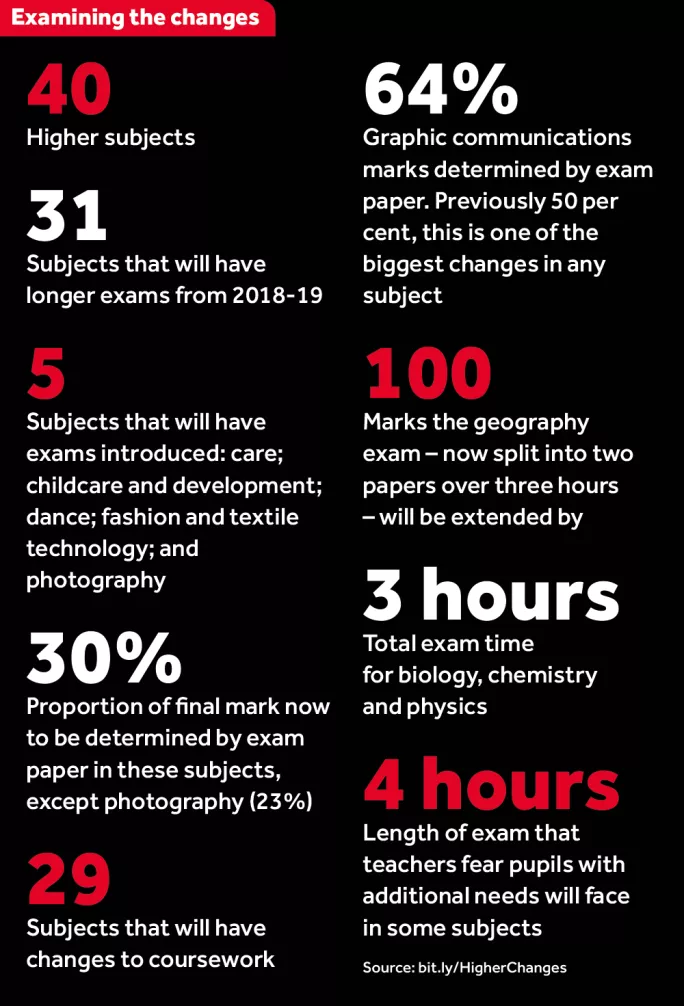
New Higher exams ‘go further than they had to’

Longer exams. Exams in subjects where none previously existed. Guidelines on changes to courses that won’t be ready until months after students have started those courses.
Those are some of the stark truths about changes to Scotland’s flagship Higher courses for 2018-19 by the Scottish Qualifications Authority (SQA), which follow the 2016 decision by education secretary John Swinney to scrap unit assessments at National 5, Higher and Advanced Higher.
The release of details about the changes to Higher has prompted angry responses among teachers, unions and academics. While there is an acceptance that something had to replace unit assessments, critics say what is planned goes too far and is not in keeping with curricular reform designed to stop Scottish education pivoting around high-stakes exams.
Tes Scotland analysis finds that, out of 40 subjects at Higher, 31 will have longer exams, while five practical subjects will have an exam where none existed before: care; childcare and development; dance; fashion and textile technology and photography.
However, full details of all the changes to the courses - which students typically begin several weeks before the summer holidays - will not be known until the end of September.
‘Punishing’ changes
Education secretary John Swinney decided to scrap unit assessments - starting with National 5 this school year and ending with Advanced Higher in 2019-20 - amid union protests that they added to teachers’ workload by duplicating swathes of coursework. In February 2017, however, there was widespread concern about the emergence of many longer exams and brand-new exams at National 5.
Now, teachers have criticised the changes to Highers published in recent weeks. On Twitter, one teacher joked that, with the environmental science exam now lasting 3 hours 15 minutes - plus a break - pupils who need extra time will “need to be given their tea by the invigilators”. Another said teachers were “exhausted” with changes to SQA courses and felt like they were being “punished” for seeking a reduction in workload.
Keith Topping, professor of educational and social research at the University of Dundee, says “longer exams are certainly not in the spirit of Curriculum for Excellence”, adding: “This seems like another step in the covert dismantling of CfE by the government, who seem to have no idea what to do to remediate Scotland’s declining position in the world of education except resort to traditional - and failed - Tory prescriptions.”
Topping calls for “more imagination in developing new kinds of assessment” - even more, shorter exams would be preferable - as exams “militate against the kind of disadvantaged student [the government] keeps saying it wants to support”.

University of Glasgow assessment expert Professor Louise Hayward says SQA’s options were limited by a “very tight timescale”, but she adds that “in the longer term it will be important to look at the examination system as a whole”, in light of recent changes, and “to reflect on its relationship with the aspirations of Curriculum for Excellence”.
EIS teaching union general secretary Larry Flanagan says that removing unit assessments was “the right thing to do” as there had been “an unsustainable assessment burden for students and staff”.
However, he adds: “There is a feeling that SQA have gone further than they had to with the changes - but as [Swinney’s] qualifications review group didn’t meet for over eight months, there was no forum to challenge that.”
Seamus Searson, general secretary of the Scottish Secondary Teachers’ Association (SSTA), says that it is “totally unacceptable for SQA to withhold details until September” and that the changes should be delayed beyond 2018-19.
An SQA spokesman says the removal of unit assessments means that “we need to strengthen course assessments to protect the integrity, credibility, breadth and standards of national courses”, but insists that the changes “adhere to the core principles of Curriculum for Excellence”.
The changes have been “carefully thought through and consist of a mixture of approaches”, with longer exam papers determined by the “specific assessment needs of each subject” and some exams split into two to allow a break.
He adds: “For the vast majority of Higher subjects, exams will remain one part of a mix of assessment which will continue to include the coursework which candidates tell us they particularly value.”
Freeing teachers to teach
SQA published the document summarising changes - which it says have been influenced by teachers’ reaction to the National 5 changes last year - after “dialogue with teachers and the relevant professional associations”.
Course-specification documents will be published by the end of April. Updated support materials, including specimen exams and coursework, will be published between May and September. The spokesman adds that the removal of units and unit assessments was welcomed by teaching unions and the timelines set by the Scottish government.
A Scottish government spokeswoman says: “These changes to the national qualifications will free teachers to teach. Teachers will not have to undertake formal unit assessments at three points during the year - a task they told us was significantly contributing to their workload, and a move welcomed by teaching unions when it was announced.”
He adds: “Exams have been extended to ensure that all the content previously assessed by the units is being covered. The increases are a reasonable and proportionate measure to compensate for the removal of a much greater level burden of assessment, represented by the units.”
You need a Tes subscription to read this article
Subscribe now to read this article and get other subscriber-only content:
- Unlimited access to all Tes magazine content
- Exclusive subscriber-only stories
- Award-winning email newsletters
- Unlimited access to all Tes magazine content
- Exclusive subscriber-only stories
- Award-winning email newsletters
You need a subscription to read this article
Subscribe now to read this article and get other subscriber-only content, including:
- Unlimited access to all Tes magazine content
- Exclusive subscriber-only stories
- Award-winning email newsletters
- Unlimited access to all Tes magazine content
- Exclusive subscriber-only stories
- Award-winning email newsletters